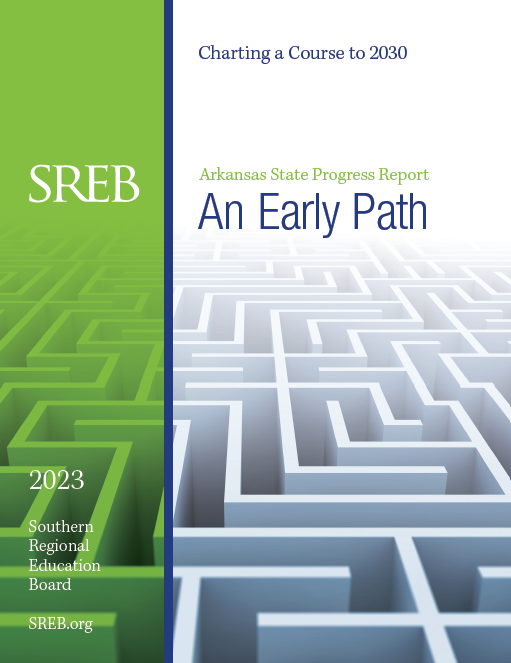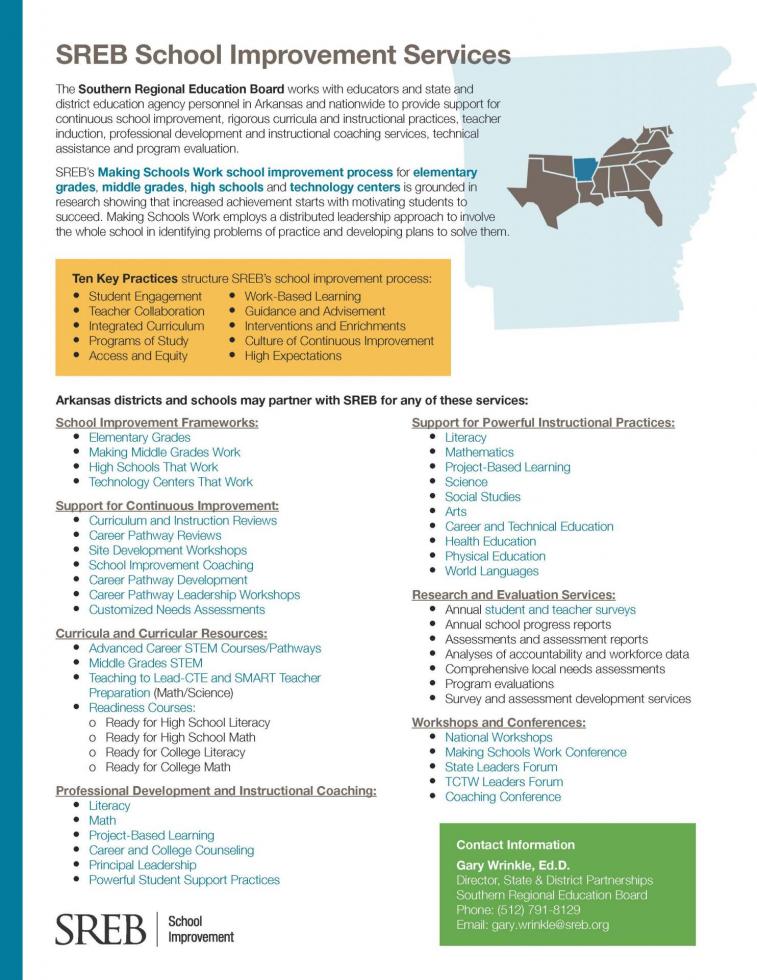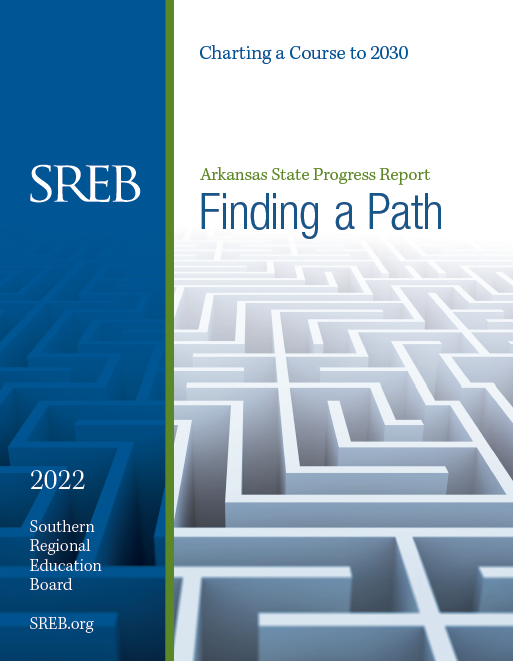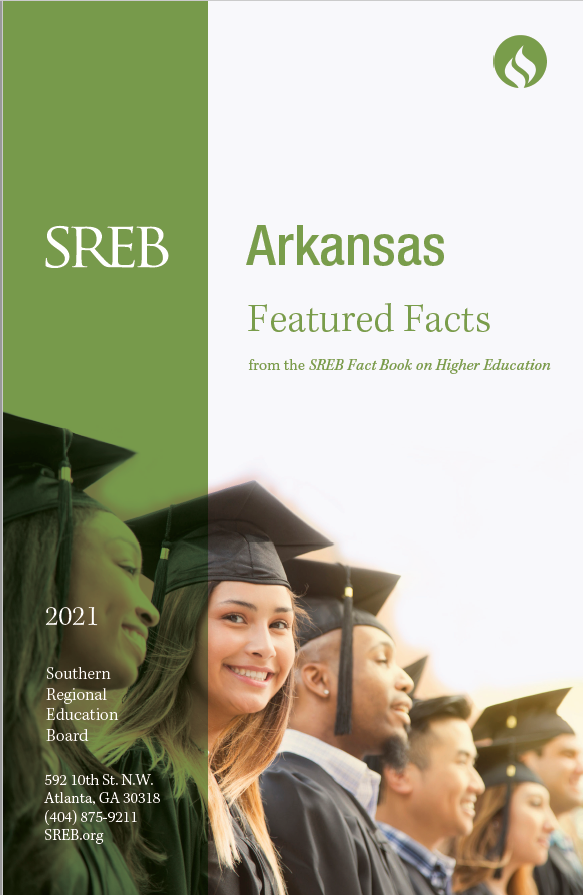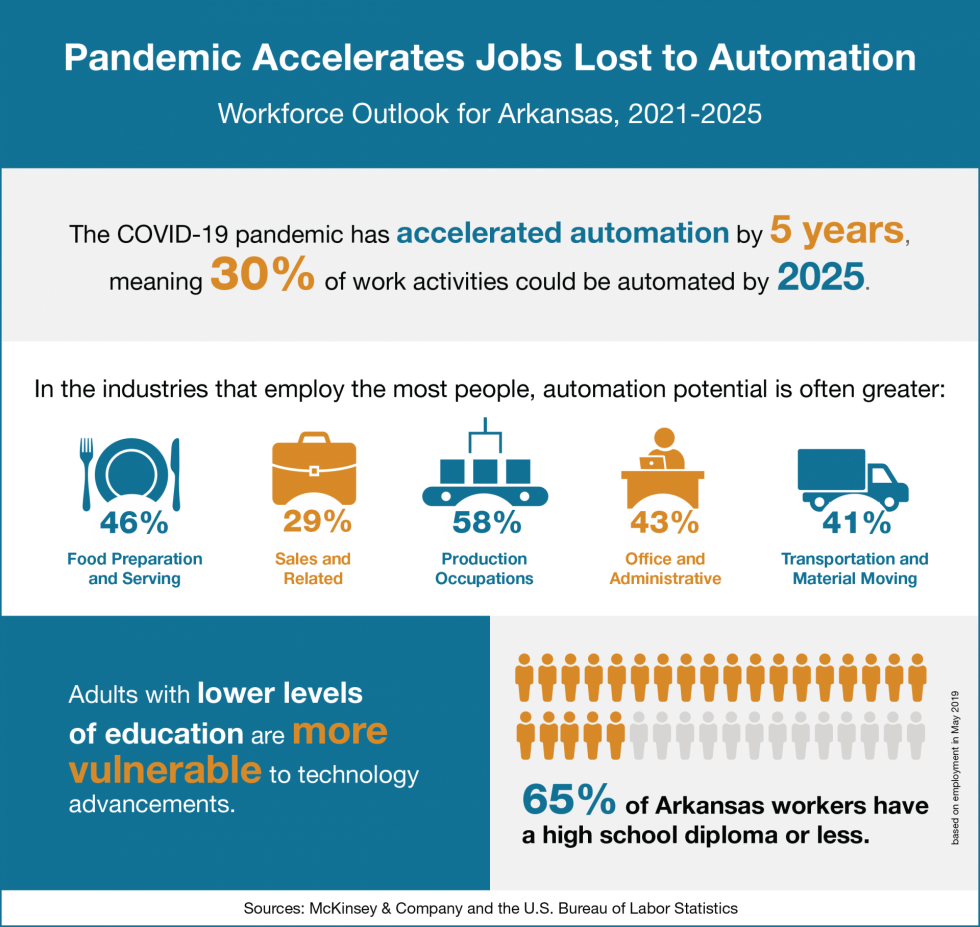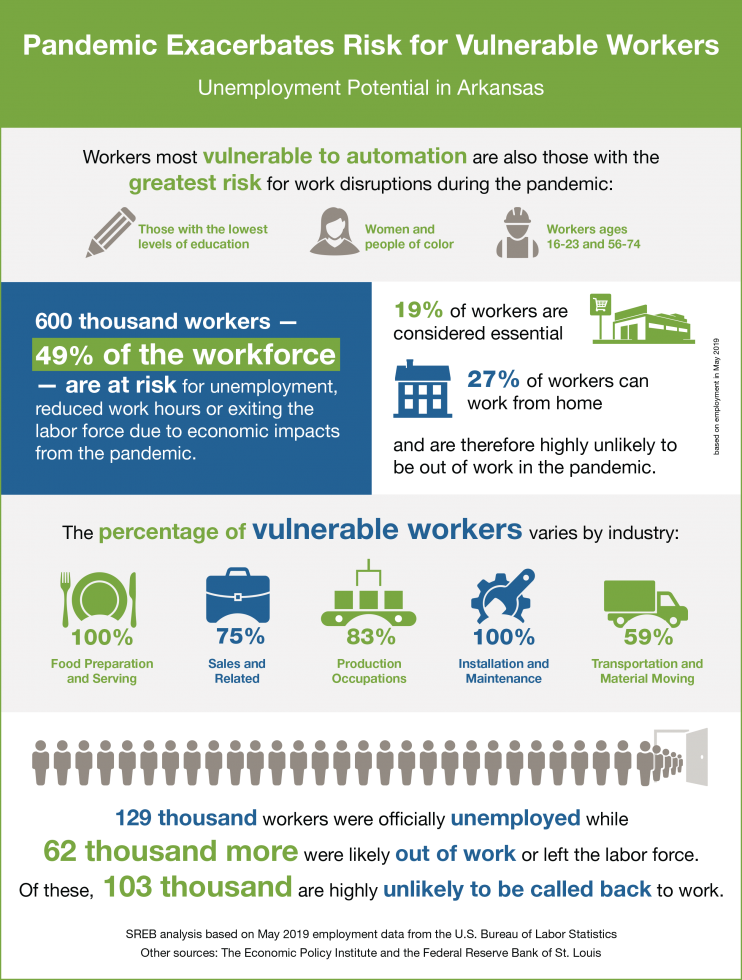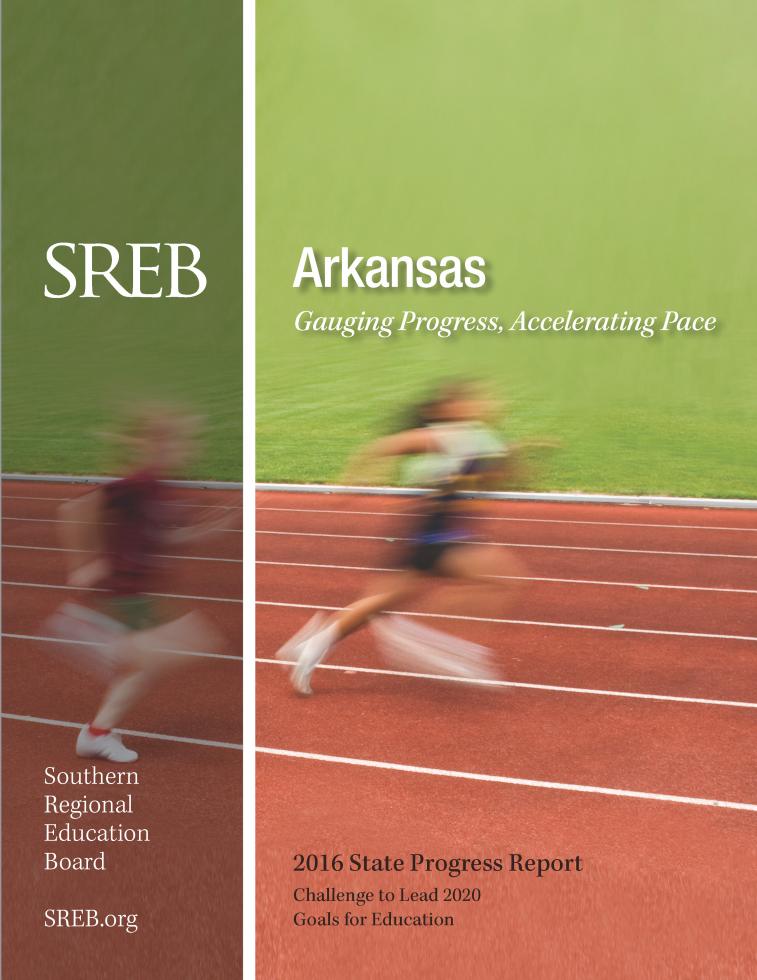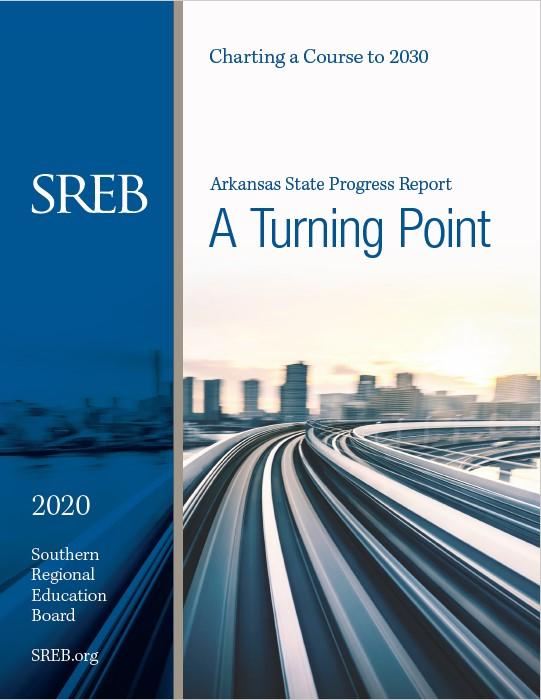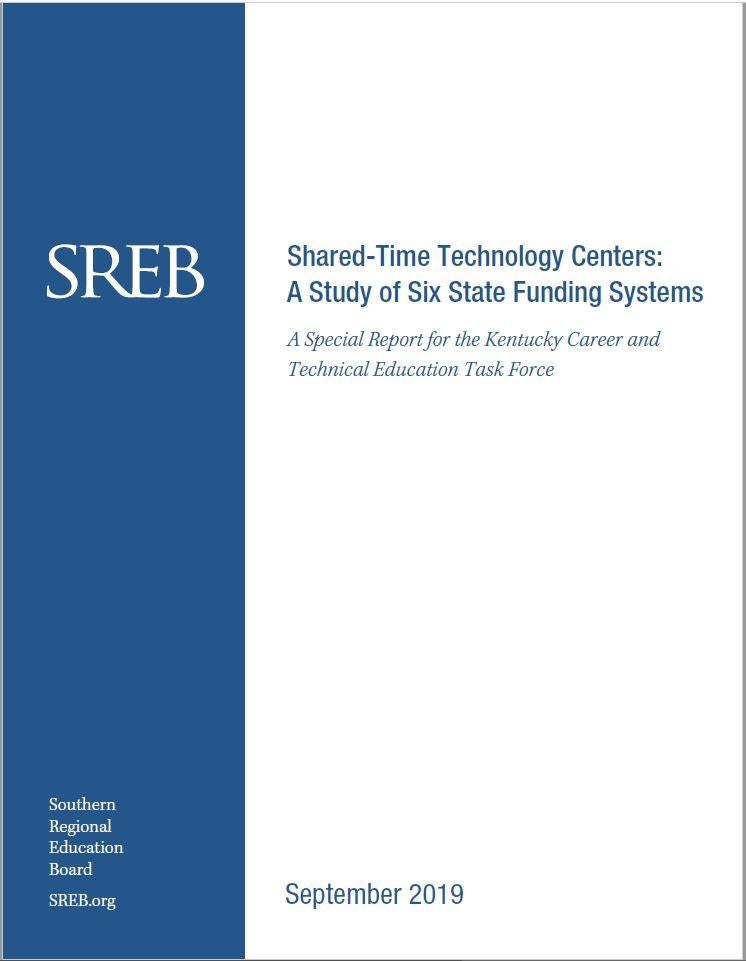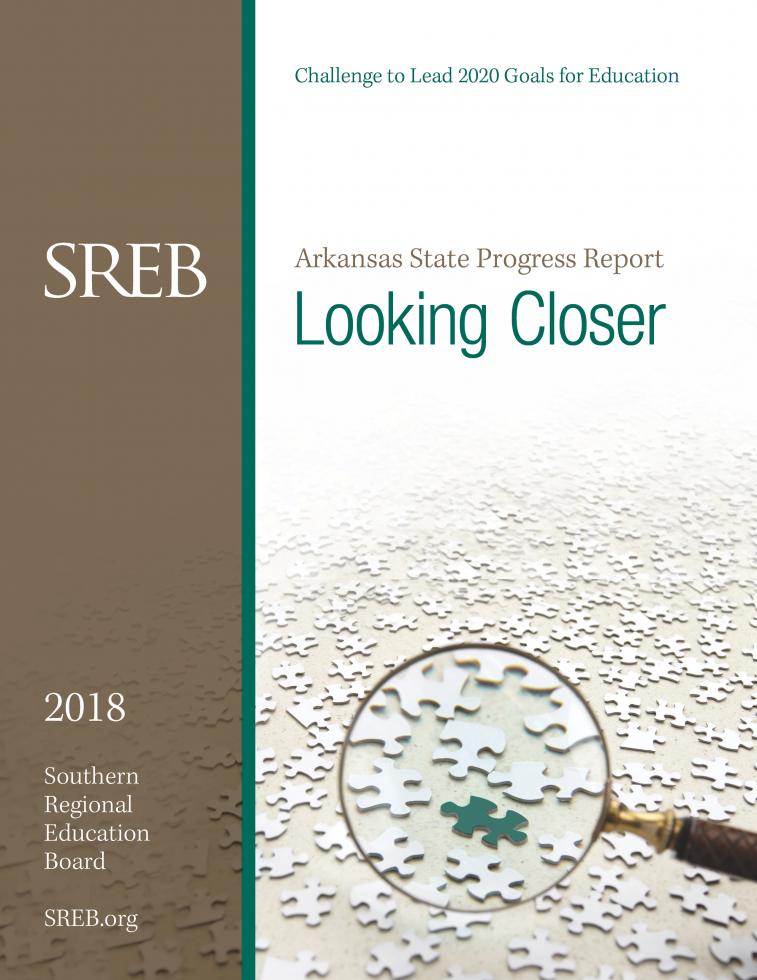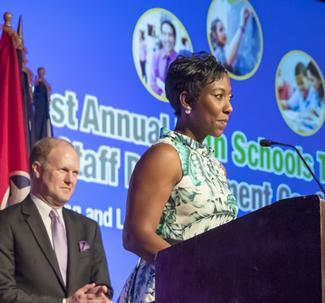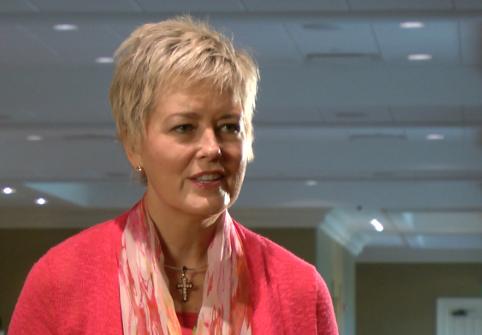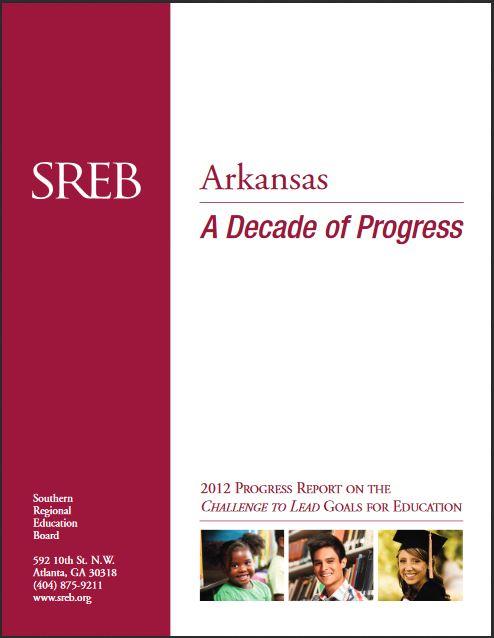State: Arkansas
Arkansas
Your guide to data and services for Arkansas
SREB works with Arkansas policymakers, colleges and schools to help them improve education. From this page, find independent, accurate data, reliable best practices and ways to share scarce resources.
Arkansas Members of the Board
Sarah Huckabee Sanders, Governor of Arkansas,
Little Rock, ex officio (2027)
Bruce Cozart, State Representative, Hot Springs
(2028) Executive Committee Member
Bill Gossage, Chief External Affairs Officer,
Electric Cooperatives of Arkansas, Little Rock (2026)
Teresa Inman, District Instructional Technology
Coordinator, Paris Public Schools (2023)
Diane Zook, Little Rock (2025)
(Appointments to the Board are made by the Governor. Terms
expire June 30 of the specified year.)
Arkansas Members of the Legislative Advisory Council
Sonia Barker, State Representative,
Smackover
Alan Clark, State
Senator, Lonsdale
Bruce Cozart,State Representative, Hot
Springs
Jane English, State Senator, North Little
Rock
John Maddox, State Representative, Mena
Arkansas Savings: Tech Purchasing, State Authorization
Arkansas saved $1.6 million on $17.6 million in technology purchases in fiscal year 2023 through SREB participation in discount agreements. Details >
Colleges and universities in Arkansas save an estimated $767,000 annually and saved an initial $2.6 million on authorization for distance learning through SARA, the State Authorization Reciprocity Agreement. Details >
Arkansas: An Early Path
An Early Path covers data and policies for each SREB state in Pre-K, elementary and middle grades in 2023. The reports also highlight important demographic data. These are SREB’s 11th progress reports to states on educational progress and the final set for the 2020 Challenge to Lead Goals. Each state report provides comparable data so states can see how they relate to one another, the SREB region and the nation.
Arkansas: School Improvement Services
The Southern Regional Education Board works with educators and state and district education agency personnel in Arkansas and nationwide to provide support for continuous school improvement, rigorous curricula and instructional practices, teacher induction, professional development and instructional coaching services, technical assistance and program evaluation.
Find out what services are available for Arkansas districts and schools in this PDF.
Arkansas: Finding a Path
Finding a Path covers data and policies for each SREB state’s progress in high school, postsecondary and the workforce. Watch for reports on birth to middle grades in 2023. These are SREB’s 10th biennial reports to states on educational progress and the final set for the 2020 Challenge to Lead Goals. They provide comparable data so states can see how they relate to one another, the Southern region and the nation. New this year: sections on the K-12 teacher and postsecondary workforces.
Arkansas Featured Facts
from the SREB Fact Book on Higher Education
Arkansas-specific data on population, demographic, education attainment, enrollment, graduation rates, workforce, tuition, debt, funding, faculty salaries and more.
Arkansas
College Affordability Profile
The SREB College Affordability Profiles provide state stakeholders with data-driven insights into the cost of higher education and its impact on students and families. These profiles highlight key affordability metrics for each of the 16 SREB states, including net price across different types of institutions, state financial aid per student, student borrowing patterns, and trends in state appropriations and tuition and fees per full-time equivalent student.
Arkansas, Georgia, Mississippi and Tennessee Educators Win National Readiness Awards
Preparing students for college-credit courses
Educators from Georgia, Mississippi and Tennessee, and schools in Arkansas and Mississippi, in were honored this week with the Southern Regional Education Board’s Readiness awards. These national awards recognize outstanding teachers and leaders offering SREB’s Readiness Courses, which help underprepared students succeed in high school and postsecondary programs without the need for remediation.
Arkansas
2020 State Workforce Outlook
Arkansas: Gauging Progress, Accelerating Pace
Gauging Progress, Accelerating Pace is the seventh biennial report to SREB states on their progress in meeting SREB’s Challenge to Lead goals for education. Each customized state report documents progress on both measurable outcomes and state policies. Through effective policy implementation, the goals can help states drive improvements in student achievement, high school graduation, college completion and workforce readiness.
Arkansas: A Turning Point
A Turning Point is the ninth biennial report to SREB states on their progress in meeting SREB’s Challenge to Lead goals for education. The 2020 report focuses on Charting a Course to 2030 — evaluating how well states are preparing their workforces for the future economy. Each customized state report documents advancement on both measurable outcomes and state policies. Through effective policy implementation, the goals can help states drive improvements in student achievement, high school graduation, college completion and workforce readiness.
Arkansas Moves Forward in Pre-K, Graduation
"Looking Closer" State Progress Reports 2018
Arkansas continues to improve public education on several key measures, according to the 2018 state progress reports from SREB. The reports detail demographic trends, student data from early childhood to postsecondary education, and the state’s implementation of key policies. Full Release >
Arkansas, Alabama And Missouri Educators, South Carolina School Win National Readiness Awards
Leadership in preparing students for success in high school and after
Three educators and a South Carolina high school were honored this week with Southern Regional Education Board awards. These recognize outstanding teaching and leadership with SREB Readiness Courses, which help underprepared students succeed in high school and postsecondary studies. The winners were honored at SREB’s Readiness Courses Institute in Orlando, Florida.
Shared-Time Technology Centers
A Study of Six State Funding Systems
Students need learning experiences connected with the world of work to equip them to enter the workforce and secure good jobs. This report provides an overview of funding for career and technical education and a detailed look at CTE funding models in Arkansas, Indiana, Ohio, Oklahoma, South Carolina and West Virginia. Produced by SREB for the Kentucky Career and Technical Education Task Force, it also offers considerations for actions to improve CTE.
Arkansas: Looking Closer
Looking Closer is the eighth biennial report to SREB states on their progress in meeting SREB’s Challenge to Lead goals for education. Each customized state report documents progress on both measurable outcomes and state policies. Through effective policy implementation, the goals can help states drive improvements in student achievement, high school graduation, college completion and workforce readiness.
Mississippi, Arkansas Educators Win National Readiness Awards
Outstanding leadership in improving college readiness for high school students
Four educators were honored this week for their work to help underprepared students succeed in high school and postsecondary studies. Mary Zluticky of Horn Lake High School in Mississippi, Phil Wesson of Sheridan High in Arkansas, and Marla Davis and Jean Massey of the Mississippi Department of Education won SREB awards.
Arkansas Schools Exceed Federal Broadband Connectivity Goals
Congratulations to the Arkansas Department of Education for its broadband connectivity accomplishments! Arkansas is now one of only six states in the nation that have met the federal target for high-speed broadband in every public school.
My Powerful LDC Moment
“Metacognition is thinking about your thinking.”
We had just finished a module on Romeo and Juliet, adolescent brain research and decision-making when I was notified of a surprise visit from the state Department of Education.
Arkansas: A Decade of Progress
This report outlines a decade of the state’s progress toward meeting SREB’s Challenge to Lead education goals. Data on key education measures for each of the 12 goals are presented, with commentary that puts the information in a regional and national context. The lead figures on each page also are available as PowerPoint slides at http://www.sreb.org/index.html


